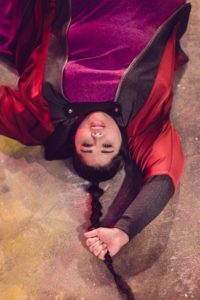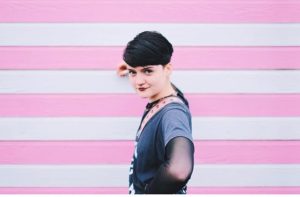Yolanda Bonnell in bug . Photos by Kaytee Dalton with set and costume design by Jay Havens
By Elizabeth Holliday
@femme.path
Yolanda Bonnell has always been a political person. “The first thing I ever wrote was a poem when I was 7 years old, and it was about freedom,” Bonnell tells Loose Lips, “I’ve always been political in some way, shape, or form.” A bisexual, pansexual, and queer Ojibwe and South Asian [theatre] artist, Bonnell is passionate about projects that say something about the world while actively trying to change it.
As writer and performer of bug, Bonnell brings her passion to the stage in a one-woman show about intergenerational trauma and addiction. With the Manidoons Collective, Bonnell will be taking bug to Coast Salish Territories as part of the 2018 rEvolver festival, bringing with her an unwavering commitment to community, representation, and good theatre.
The idea for bug began germinating in Bonnell’s first year at Humber College. “I was walking down the street and I saw this potato bug crawling across the sidewalk […] I had this moment like, ‘man, that struggle is so real, it’s just trying to get to the other side but someone could just step on it.’ The correlation of that and Indigenous women was not lost on me.” Bonnell used bugs—Manidoons—as her central image of addiction. Crawling under her character’s skin, passed down through generations, Bonnell uses the Manidoons to explore the relationship between addiction, the cycle of intergenerational trauma, and its “impact on Indigenous women in particular.”
“When you put an Indigenous body on stage it’s making an inherently political statement, our bodies in spaces are political,” says Bonnell. Her written work has focused largely on Indigenous women’s experiences, drawing from her own life and the lives of those around her to tell stories that are seldom told. Indigenous women, Bonnell shares, “are the most silenced voice. It’s so important to raise us up because we are leaders–these are the stories that I want to tell right now.”
Holding up her community through representation is vital for Bonnell, so much so that each stop of the bug tour involves a storytelling workshop for Indigenous youth in that area. The youth then have the option of performing a pre-show to bug. It’s “important for youth to know that we want to hear their voices,” Bonnell stresses, and if “it could spark something in even just one person to be like “this is what I want to do,” then we’ve added another voice to that fight.”
As a one-woman show, bug presents intergenerational trauma in a single body, a way of showing how it is passed down through lineage; it is told in cycles that “[jump] in and out of different times,” and for Bonnell, this speaks both to the timelessness of Indigenous peoples, as well as the “time lost in addiction and […] the struggle to find identity in the colonial state.” Incorporating prose, poetry, and movement, Bonnell uses a dynamic style of storytelling. “I don’t like spoon-feeding a story to the audience,” she says, “I want to make you think, I want to make you connect.” Some of this connection is achieved through the pieces’ intimacy; presented in the round, bug finds Bonnell up close and personal with her audience, a staging decision borne partly from questioning what makes Indigenous theatre. “Circles have a lot in our culture and so I wanted to bring that [into] this,” Bonnell shares, “it feels like artistic ceremony in a way.”

As Bonnell notes, solo performance presents its challenges: “there’s a lot of responsibility in carrying every moment.” But with a growing creative team including Director Cole Alvis, she has found support in a group that connects deeply to her work. “When we had amassed our team for the first time, there were like three Indigenous women in that room who all sort of went ‘that happened to me,’” Bonnell says; that “is and will always be my reason for doing it.”
When I ask Bonnell for last thoughts, she leaves me with this: “We should always be looking towards Indigenous women for leadership when we’re trying to find the voice of change and the impact of political resistance.” For those of us in attendance, bug is a perfect way to do just that.
Now in its fifth year, rEvolver Festival is the latest iteration of Upintheair Theatre’s long history of festival production. rEvolver focuses on giving professional opportunities to emerging artists of a range of theatrical practices. Hosted at the Cultch, the 2018 festival runs from May 23—June 3, and features 14 productions as well as staged readings. Grab your tickets to bug and other productions here.

Elizabeth is a writer, actor, and full-time nerd living on Unceded Coast Salish Territories. With a BA in Gender, Race, Sexuality, and Social Justice, she is passionate about media that challenges norms, beliefs, and mainstream representation. You can find her listening to true crime podcasts and trying to find good places to dance (she’ll take recommendations).




